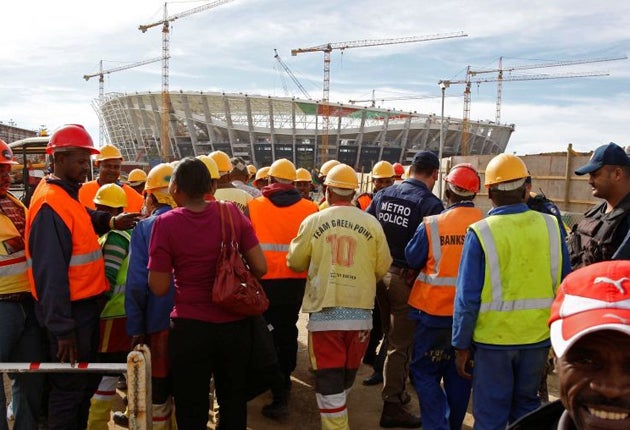Game on for Zuma as workers strike at World Cup stadiums

Your support helps us to tell the story
From reproductive rights to climate change to Big Tech, The Independent is on the ground when the story is developing. Whether it's investigating the financials of Elon Musk's pro-Trump PAC or producing our latest documentary, 'The A Word', which shines a light on the American women fighting for reproductive rights, we know how important it is to parse out the facts from the messaging.
At such a critical moment in US history, we need reporters on the ground. Your donation allows us to keep sending journalists to speak to both sides of the story.
The Independent is trusted by Americans across the entire political spectrum. And unlike many other quality news outlets, we choose not to lock Americans out of our reporting and analysis with paywalls. We believe quality journalism should be available to everyone, paid for by those who can afford it.
Your support makes all the difference.South African construction workers began an indefinite strike yesterday, halting work at stadiums for the 2010 World Cup in the biggest industrial action since President Jacob Zuma took office in May.
The National Union of Mineworkers said the action by about 70,000 workers would continue until employers gave in to their demand for a 13 per cent pay rise. The companies have so far refused to go beyond 10 per cent.
Escalating strike action is a major challenge for Mr Zuma, who has to balance the demands of the union and leftist allies who helped bring him to office with keeping market-friendly policies at a time when Africa's biggest economy is in its first recession in 17 years.
The union, South Africa's biggest, said most of its members in the building sector had joined the protest at sites for the stadiums and other big infrastructure projects including the Gautrain high-speed rail project. Scores of striking workers danced and sang at the site of a new station in Johannesburg's Sandton financial district.
"Our intention is to take it forever, for as long as the employers are not bringing what we want to the table," said union spokesman Lesiba Seshoka.
Eurasia Group analyst Mike Davies said there was some way to go before the strike became a major concern, but it was being closely followed by investors ahead of the World Cup. "They will be looking for signs that Zuma will be unafraid to make difficult decisions when the time comes," he said.
South Africa's powerful Cosatu union federation fully backed the strike, saying it was as passionate about the World Cup as anyone but would not tolerate stadiums being built by workers who were underpaid or in unhealthy conditions.
Officials have said the 10 World Cup stadiums, half of them new, will be delivered by December, although there have been reports of possible delays at the venue in Cape Town. "We believe that the strike will be resolved as soon as possible and remain confident that the stadiums will be completed on schedule," the organising committee said.
Join our commenting forum
Join thought-provoking conversations, follow other Independent readers and see their replies
Comments